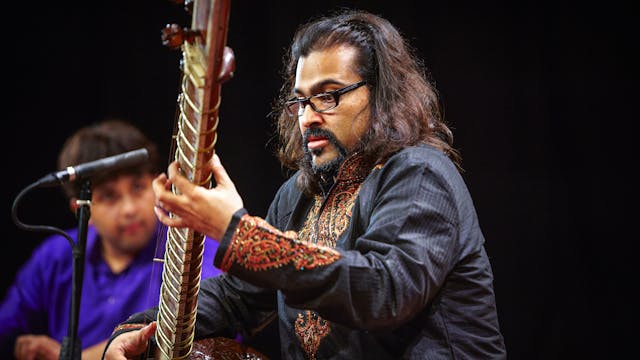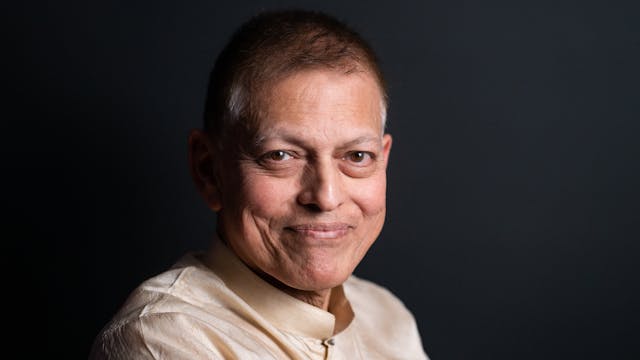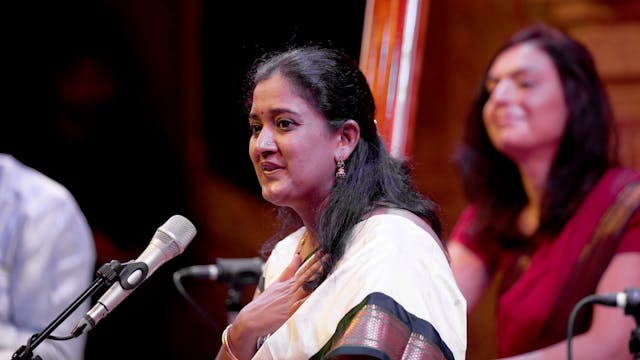Purbayan Chatterjee | Darbari Kanada
Evening Ragas
•
17m
Recorded at Darbar Festival 2011, on 23rd April, at King's Place, London.
Musicians:
- Purbayan Chatterjee (sitar)
- Anubrata Chatterjee (tabla)
- Debipriya Das (tanpura)
Raag Darbari Kanada, Thaat: Asavari, Samay: Midnight
This is the second piece from Purbayan Chatterjee’s performance at the Darbar Festival 2011. He introduces Darbari Kanada with a comprehensive alap, traversing both the lower and upper octaves. The composition is a legendary tarana in ektaal (12 beats) immortalised by the late Ustad Amir Khan of Indore gharana.
Chatterjee sings the tarana, ‘Ya re man biya biya’ in full before interpreting it on his sitar. During the 60’s, late Ustad Khan had applied a technique of permutation and combination in this tarana called ‘meerkhand’, giving it a new texture and feel altogether. Maintaining a good balance between the instrumental and vocal nuances, Chatterjee gives a fine interpretation of this tarana on his sitar applying the same technique.
Anubrata Chatterjee gives a brilliant accompaniment on the tabla, infusing intricate tukdas with clarity and steadiness in this short take of Raag Darbari Kanada.
Darbari Kanada is an extremely popular raga belonging to the cluster of Kanadas. Its origin is popularly attributed to Miyan Tansen, one of the ‘nine jewels’ of Mogul Emperor Akbar’s court. Its Persian name, referring to ‘darbar’ or royal court, bears the stamp. However, it is believed to be an ancient raga, reinvented by Tansen to suit the innovative traits of Hindustani classical stream which enhanced its regal persona with the help of heavily oscillating key phrases.
Darbari Kanada belongs to the Ashavari thaat and deploys komal Ga, Dha and Ni (flat 3rd, 6th and 7th). The dominant note is Re and the sub-dominant is Pa. The heavily oscillated movement of Ga in the key phrases and powerful gamaks makes this raga very somber by nature which flowers the best in the lower-mid octaves.
Purbayan Chatterjee has learned to play the sitar from his father, Pandit Parthapratim from the age of 5. He trained in the Senia Maihar style, drawing from the rich tone and melodic depth of Pandit Nikhil Banerjee’s sitar. He was deeply influenced by Pandit Ajoy Chkraborty’s music during his teenage years. At the age of 15, Chatterjee began to learn from Ustad Ali Akbar Khan which refreshed his perceptions about music. Regular stage performances began at 17 after he received the national award from the President of India as the best instrumentalist of the country in 1993. Thereafter, he has performed in major festivals and venues all over India and the five continents. Chatterjee is deeply influenced by the music of Ustad Vilayat Khan, Ustad Rais Khan, Ustad Zakir Hussain and Jazz legend Pat Metheny from whom, he draws inspiration from time to time.
Anubrata Chatterjee plays the Farukkhabad style; His talent has earned him accolades around the world because of the clarity of his bols, power, tonal richness and steadfast ‘laykaari’. He is the son and
disciple of leading tabla player Pandit Anindo Chatterjee and has also trained under the legendary musician Jnan Prakash Ghosh (1909-1997). He peppers his Farukhabad-based playing with touches of Lucknow and Ajrada gharanas and has established himself as one of the most sought-after accompanists and an accomplished solo tabla artist at a young age.
Up Next in Evening Ragas
-
Purbayan Chatterjee | Maru Bihag
Recorded at Darbar Festival 2011, on 23rd April at King's Place, London.
Musicians:
- Purbayan Chatterjee (sitar)
- Anubrata Chatterjee (tabla)
- Debipriya Das (tanpura)Raag Maru Bihag; Thaat: Kalyan; Samay: Night
Purbayan Chatterjee plays the much loved, Raag Maru Bihag as the opening melody...
-
Pandit Budhaditya Mukherjee | Raga Nand
Recorded at Darbar Festival 2019, on the 13th October, at the Barbican Centre.
Musicians:
- Pandit Budhaditya Mukherjee (sitar)
- Soumen Nandy (tabla)Raag Nand; Thaat: Kalyan; Samay: Night
Pandit Budhaditya Mukherjee bends the rules of Indian classical music in his graceful way and with ex...
-
S5 EP3 | Manjiri Asnare-Kelkar
Recorded at Darbar Festival 2012, on 28th September, at the Southbank Centre, London.
Musicians:
- Manjiri Asanare-Kelkar (vocal)
- Vishwanath Shirodkar (tabla)
- Tanmay Deochake (harmonium)
- Priya Parkash (tanpura)
- Shobhana Patel (tanpura)Raag Raisa Kanada; Thaat: Kafi; Samay: Evening...



